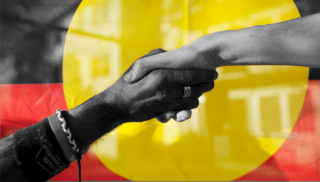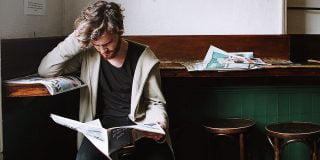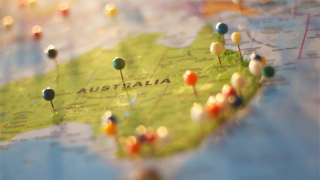Each Anzac Day I find myself struggling between a desire to honour the sacrifice made by those who went to war and the desire to dissociate myself from the idealisation of our soldiers as beyond critique and above reproach. I want to affirm the day is one on which we remember the horrors of war, yet am perplexed by the way such a memory is cast by surrounding ourselves with all things military.
This Anzac Day my thoughts turn in a new direction. There is often talk about our soldiers going to war to protect our freedom. Although it’s a statement that needs to be heavily qualified, it is nonetheless worthwhile to think about what freedom means and to ask whether we are doing justice to the concept of freedom that we hold so dear that we would go to war over it.
At the core of the Western tradition of political freedom is the idea that all people are equal, and this means that all should find a place in society where they are free to think their own thoughts, practice their own religion, live their own values. Moreover our equality demands that we care for one another, that we ensure we live in a society where everyone gets to share in the abundance of the land and the economy and no one is left wallowing in poverty or extreme disadvantage.
In 1914 as young men went starry-eyed off to Gallipoli only to discover the brutality of war, our nation was still a long way from realising the ideal of freedom for which they fought. Women, indigenous people, and Asians were neither equal before the law nor equal in how they were treated within our communities. Yet in the embrace of liberal democracy lay the seeds of equality, justice and inclusion that would lead us to the society we live in today, one where there have been vast strides made towards the full experience of freedom and its fruits for women, indigenous people and non-anglo migrants.
If we are to be true to this legacy of freedom I suspect we need to ask what are the next frontiers for us in taking hold of this notion that we stand together as equals? I suspect the challenges that lie ahead of us will be in areas of:
Unfinished business
While it is much better to be a woman, an indigenous person, or non-Anglo Australian in 21st-century Australia that it was 100 years ago when our soldiers went off to fight in the Second World War, there is nonetheless still work to be done in these areas. The unacceptably high rates of domestic the gender pay gap, the gap in health and well-being outcomes between indigenous and nonindigenous Australians, the failure to reach a treaty or settlement of some kind with our indigenous peoples, and the racism that sometimes revisits ugly head, suggest we still need to be working on what our freedom means for women, indigenous peoples and immigrants.
Religious freedom
In the last decade or so we have seen a rise in intolerance for religion. At the extremes we see some of the new atheists declaring that raising your children in a religious environment is child abuse, and the current debate at Sydney University over membership of student Christian societies. Comics feel free to ridicule people of religious faith in ways that would not ridicule people of alternate sexualities or cultural minorities. And then there are the religious fundamentalists, whether they be the violent extremists found in some parts of the world, or the vocal minority of Christians filled with hatred for Muslims, Or the Conservative but mainstream Christians fighting to hang onto the last vestiges of privilege offered to the church by Christendom. Surely, from one perspective at least, these are all signs that we are still trying to figure out the place of religion in a secular/pluralist society.
Over the coming decade I suspect we will define ourselves either as a secular society, in which religion belongs purely to the realm of the private and the personal and is banished from the public space, or pluralist, in which religion is seen as one part of a diverse society. On a secular model, for example, there would be no space for religious schooling, whereas a pluralist model would see religious schools as one-way people in our society organise schooling around their meaning systems.
Sexual identity
In the strident opposition to same-sex marriage, and the underlying philosophical issues that have emerged in the discussion of the safe schools program, it is clear we have not yet worked out what the principles of liberalism mean for people whose sexuality is not heterosexual.
Global citizenship
Just as we have had to work out what it means for us to say “all people are equal” with regards to the status of women, indigenous, and minority groups in our society, so I believe will need to work out what it means to say all people are equal with regards to the global community. We live in such an interconnected age that is no longer possible to simply think about the how the principles of liberalism apply to our own society. We must think about what it means for how we act on the global stage. At the moment too many of our policies violate human rights (e.g. our treatment of asylum seekers), disregard human rights of non-Australians (e.g. our ever diminishing aid budget suggests little regard for the right of all people on this planet to enjoy the fruits of the earth), and pay insufficient attention to the quickly gathering impacts of human consumption on our global environment.
I assume that those unfortunate young Australian men who lost their lives at Gallipoli would scarcely have imagined that just a few generations after theirs Australia would be so different in its treatment of women, our indigenous peoples, or people whose cultural background was not English-speaking European. I would like to hope that they would be pleased.
And I’m certain that we do not honour those who fought for freedom by freezing Australia in a time capsule in which the Australia they knew is preserved forever, but that we honour them by taking up the cause of freedom as it presents itself to our generation.







How shall we honour those who fought for freedom? A reflection on Anzac Day 2016 | https://t.co/6loqoJ5z3s https://t.co/gQlDhUTkH2
I love the way you think. Insightful and necessary.
Thanks for the encouragement Tania! Much appreciated.